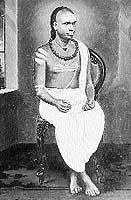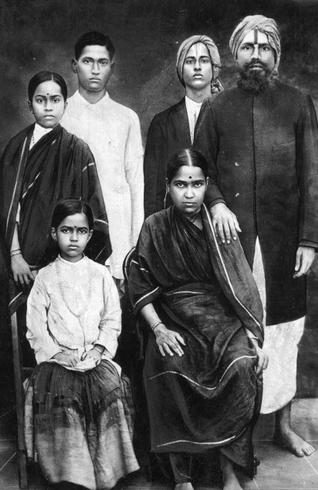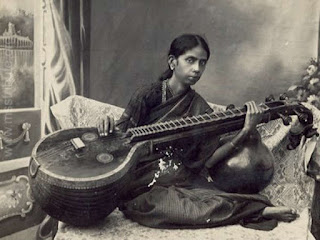16-EngaL vELvik kUDamIdil
- Get link
- X
- Other Apps
by arasi »
SIXTEEN
EngaL vELvik kUDamIdil
(In Our Place of Sacrifice)
Ananda varusham was not a year of joy at all as its name suggests. It brought a lot of unhappiness with it. The World War and many other ills were in store for us in the so-called happy year.
My life changed too. I was in Chennai now. After a while, I went to Puduvai for a week with my mother to see my father. When the schools closed, my husband came, and I went with him to Puduvai again. He went back to Mysore after a week. I stayed on. The World War which had started in Ananda varusham went on and it was RAkshasa varusham now.
A french scholar called Paul Richard had come to Puduvai to spend some time with Aravinda Ghosh to study the vEdAs with him. He also became a friend of BharathiyAr, Iyer and my father.
I don't know why, but because he had seven children, he had to fight in the war (Bharathi told us), and Richard was going back to Paris because of that.
A farewell tea party was arranged for him. We were there. Richard, Madame Richard (later, The Mother!), her two daughters and friends were sitting at a round table which had chairs all around it. The table was piled with china plates and cups. That was the first time I had been to a tea party. But for my mother and Bhagyalakshmi Ammal, we partook of the tea and tiffin, while they chewed on betel leaves. After the party, we walked in the beach.
Bharathi: Listen to this! It's interesting. Richard and Madame Richard have no children and yet, because he's the father of seven children, he has to fight in the war! Why is it so? Can anyone guess?
Chellamma: It's beyond me! Who knows? His brothers may have children. What strange laws!
Bharathi: Chellama, I agree it's puzzling but it's true. Richard has three children by his previous wife and Madame has four who were born to her first husband and his former wife. Since these two married, they are counted as their children.
Chellamma: Siva SivA! Enough about the way they live! To have four children with one, and marry again!
Bharathi: That's their way. I mentioned Ravindranathar's story called Giribala or mAna Bhangam to you. It's a very good story. In it, he says that more than when we humans are still like sculptures, it's in the walking, the movements of our hands, our smiling and in our looking in all four directions that we can truly see beauty in the human form. Anyway, in this story, the husband controls his wife at first. Eventually, the wife does the same to him! This is the new way. What do you think of it?
Chellamma: I don't like it. If a cow or oxen gets old, you get a new one. It's fine when it comes to animals. It is not the same with us humans (I do not understand why she says this, or why Yadugiri writes so! Or, was there more by way of conversation in the manuscript and this reference is not about Tagore's story at all but was about Richard? Were some lines omitted and got mixed up while printing it?--Arasi).
Bharathi: What do you say to this, Yadugiri?
Yadugiri: It's difficult to argue with you. I'd say it's not easy for a woman to live with such a husband in the first place, and I agree. Yet, what follows is unacceptable. Just because foreigners do anything they wish, is it a civilized thing for us to copy it? (You see what I mean about the mix-up--Arasi).
Bharathi: You are saying exactly what Chellamma has said, but in a different way. Never mind! Did you notice that your mother and Iyer's wife didn't drink any tea at all? Madame Richard and I noticed their putting the tea cups under the table. Why did they do that?
Yadugiri: My mother would not drink from anything else but a silver tumbler. She does not like tea or coffee either. Do you expect her to drink from the same cup which had been sipped from by others? Bhagyalakshmi Ammal is the same. She might not like tea either.
Bharathi: They had their own cups--not something others had sipped from!
Yadugiri: And then there was a single tablecloth touching everyone. They don't like it either. Chellamma didn't protest because of you. No one can persuade BhayathammaL.
Bharathi: I thought the svadESi families are open to new ways! Doesn't seem to be so! We may have to wait a bit longer, perhaps.
Yadugiri: When my mother had a severe stomach problem, Dr. Ambeau said that drinking coffee was good for her. We asked her to drink it as if it were medicine. She refused.
Chellamma: Our ways are the best. You are the one who gets excited about all that is new!
Bharathi: It's eight o' clock! Let's head back home.
I stayed in Puduvai for a month. A marriage in Bangalore in my in-law's family meant that I had to go back. I went to Bharathi and Iyer's house to say goodbye. Bharathi had just finished writing a poem called agni dhOmam. He sang it to us: engaL vELVik kUDamIdil. He sang one line with vigor and majesty. The next one, tragically, alternating his tone to the end of the song. The crying out of the asurAs melted our hearts. There were tears in Chellamma's eyes.
Bharathi: Great! Are you crying because all the diseases perish! My, my!
Chellamma: When you sing with such feeling, I can't help crying!
Yadugiri: May I have that piece of paper, BhArathiyArE? Last time, the police in Vizhuppuram took away the song you had given me.They are a load of trouble. I hope they don't do it this time!
Bharathi: Write on it in block letters--agni dhOmam, and they won' touch it!
Chellamma: If they see your name on it, they will seize it. Yadugiri, write this song down in your note book. Don't take it with you.
Yadugiri: I've written down 'pudumaip peN' already. I don't have the time now. Let me just keep this paper in my notebook and take it. As BharathiyAr said, I will write on it in block letters--agni dhOmam.
Bharathi: Do that. If they still take it away, I will send you another copy, don't worry. Have a good journey.
I then went to Iyer's house. He had recently written Mangaiyarkkarasiyin kAdal and KuLattangarai arasa maram. Both were tragic stories. I cursed Nagarajan (hero of the second story--publisher). Iyer said, we have plenty of happy stories, but tragic stories have their own charm.
I left that very night. As Bharathi had said, they did not bother to snatch away his song from me this time!
* * * * *
EngaL vELvik kUDamIdil
(In Our Place of Sacrifice)
Ananda varusham was not a year of joy at all as its name suggests. It brought a lot of unhappiness with it. The World War and many other ills were in store for us in the so-called happy year.
My life changed too. I was in Chennai now. After a while, I went to Puduvai for a week with my mother to see my father. When the schools closed, my husband came, and I went with him to Puduvai again. He went back to Mysore after a week. I stayed on. The World War which had started in Ananda varusham went on and it was RAkshasa varusham now.
A french scholar called Paul Richard had come to Puduvai to spend some time with Aravinda Ghosh to study the vEdAs with him. He also became a friend of BharathiyAr, Iyer and my father.
I don't know why, but because he had seven children, he had to fight in the war (Bharathi told us), and Richard was going back to Paris because of that.
A farewell tea party was arranged for him. We were there. Richard, Madame Richard (later, The Mother!), her two daughters and friends were sitting at a round table which had chairs all around it. The table was piled with china plates and cups. That was the first time I had been to a tea party. But for my mother and Bhagyalakshmi Ammal, we partook of the tea and tiffin, while they chewed on betel leaves. After the party, we walked in the beach.
Bharathi: Listen to this! It's interesting. Richard and Madame Richard have no children and yet, because he's the father of seven children, he has to fight in the war! Why is it so? Can anyone guess?
Chellamma: It's beyond me! Who knows? His brothers may have children. What strange laws!
Bharathi: Chellama, I agree it's puzzling but it's true. Richard has three children by his previous wife and Madame has four who were born to her first husband and his former wife. Since these two married, they are counted as their children.
Chellamma: Siva SivA! Enough about the way they live! To have four children with one, and marry again!
Bharathi: That's their way. I mentioned Ravindranathar's story called Giribala or mAna Bhangam to you. It's a very good story. In it, he says that more than when we humans are still like sculptures, it's in the walking, the movements of our hands, our smiling and in our looking in all four directions that we can truly see beauty in the human form. Anyway, in this story, the husband controls his wife at first. Eventually, the wife does the same to him! This is the new way. What do you think of it?
Chellamma: I don't like it. If a cow or oxen gets old, you get a new one. It's fine when it comes to animals. It is not the same with us humans (I do not understand why she says this, or why Yadugiri writes so! Or, was there more by way of conversation in the manuscript and this reference is not about Tagore's story at all but was about Richard? Were some lines omitted and got mixed up while printing it?--Arasi).
Bharathi: What do you say to this, Yadugiri?
Yadugiri: It's difficult to argue with you. I'd say it's not easy for a woman to live with such a husband in the first place, and I agree. Yet, what follows is unacceptable. Just because foreigners do anything they wish, is it a civilized thing for us to copy it? (You see what I mean about the mix-up--Arasi).
Bharathi: You are saying exactly what Chellamma has said, but in a different way. Never mind! Did you notice that your mother and Iyer's wife didn't drink any tea at all? Madame Richard and I noticed their putting the tea cups under the table. Why did they do that?
Yadugiri: My mother would not drink from anything else but a silver tumbler. She does not like tea or coffee either. Do you expect her to drink from the same cup which had been sipped from by others? Bhagyalakshmi Ammal is the same. She might not like tea either.
Bharathi: They had their own cups--not something others had sipped from!
Yadugiri: And then there was a single tablecloth touching everyone. They don't like it either. Chellamma didn't protest because of you. No one can persuade BhayathammaL.
Bharathi: I thought the svadESi families are open to new ways! Doesn't seem to be so! We may have to wait a bit longer, perhaps.
Yadugiri: When my mother had a severe stomach problem, Dr. Ambeau said that drinking coffee was good for her. We asked her to drink it as if it were medicine. She refused.
Chellamma: Our ways are the best. You are the one who gets excited about all that is new!
Bharathi: It's eight o' clock! Let's head back home.
I stayed in Puduvai for a month. A marriage in Bangalore in my in-law's family meant that I had to go back. I went to Bharathi and Iyer's house to say goodbye. Bharathi had just finished writing a poem called agni dhOmam. He sang it to us: engaL vELVik kUDamIdil. He sang one line with vigor and majesty. The next one, tragically, alternating his tone to the end of the song. The crying out of the asurAs melted our hearts. There were tears in Chellamma's eyes.
Bharathi: Great! Are you crying because all the diseases perish! My, my!
Chellamma: When you sing with such feeling, I can't help crying!
Yadugiri: May I have that piece of paper, BhArathiyArE? Last time, the police in Vizhuppuram took away the song you had given me.They are a load of trouble. I hope they don't do it this time!
Bharathi: Write on it in block letters--agni dhOmam, and they won' touch it!
Chellamma: If they see your name on it, they will seize it. Yadugiri, write this song down in your note book. Don't take it with you.
Yadugiri: I've written down 'pudumaip peN' already. I don't have the time now. Let me just keep this paper in my notebook and take it. As BharathiyAr said, I will write on it in block letters--agni dhOmam.
Bharathi: Do that. If they still take it away, I will send you another copy, don't worry. Have a good journey.
I then went to Iyer's house. He had recently written Mangaiyarkkarasiyin kAdal and KuLattangarai arasa maram. Both were tragic stories. I cursed Nagarajan (hero of the second story--publisher). Iyer said, we have plenty of happy stories, but tragic stories have their own charm.
I left that very night. As Bharathi had said, they did not bother to snatch away his song from me this time!
* * * * *
continued at
- Get link
- X
- Other Apps


